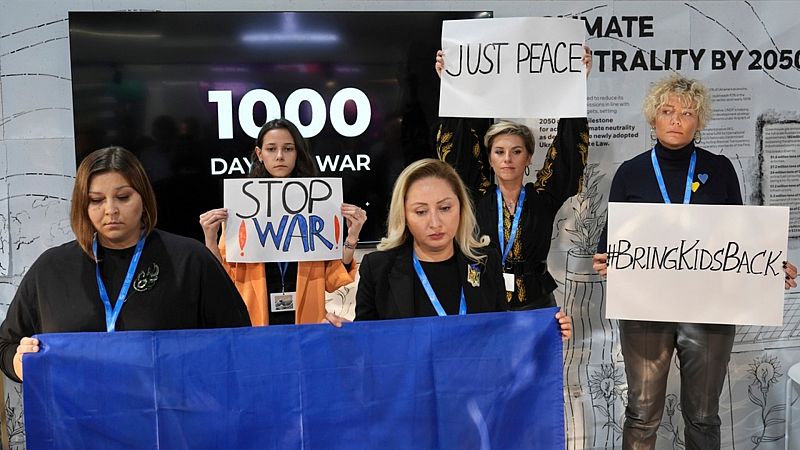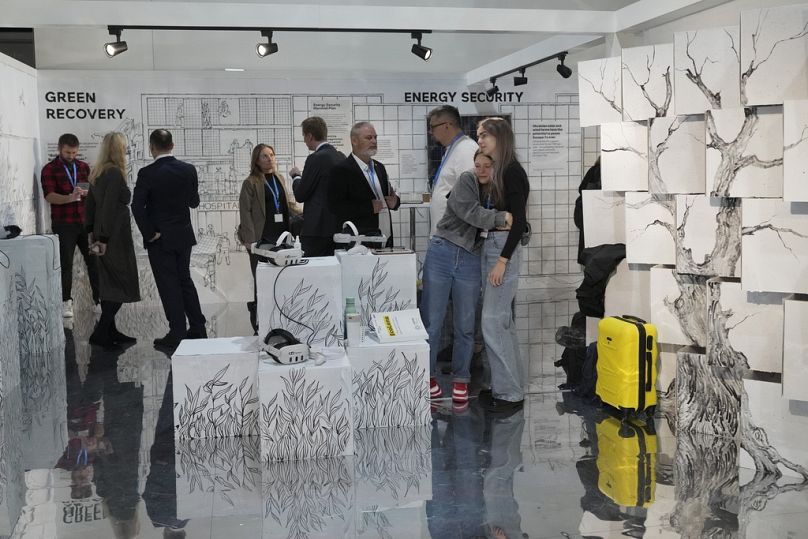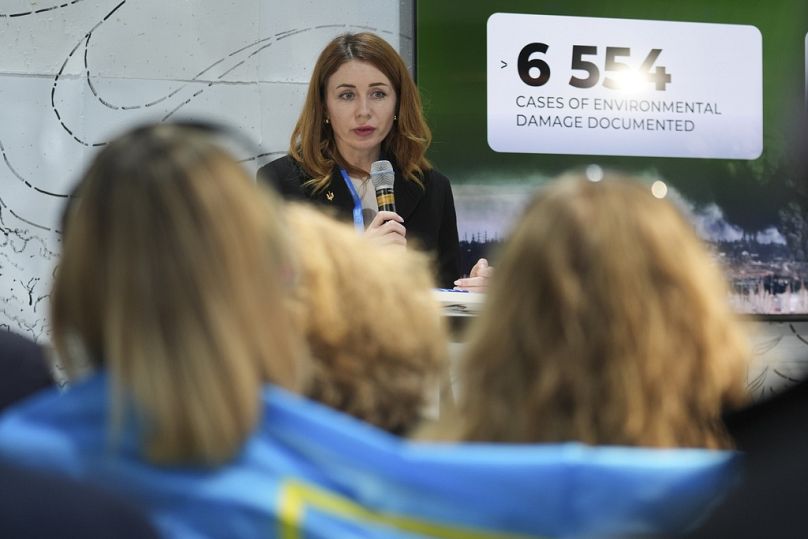‘The path to peace doesn’t pass through pipelines’: Ukraine marks 1,000 days of war at COP29

Tuesday marked 1,000 days since Russia’s full-scale invasion of Ukraine began.
The anniversary came as leaders of the world’s 20 leading economies issued a joint declaration calling for a global pact to combat hunger, peace in Ukraine, more aid for Gaza and an end to hostilities in the Middle East.
It highlighted humanitarian concerns in both Ukraine and Gaza but did not attribute blame to Russia or Israel or outline specifics on how these goals would be achieved.
G20 leaders also backed the need for a new climate finance deal at COP29 but caused upset in Baku by not directly mentioning a transition away from fossil fuels.
For Ukrainian environmental campaigners, the failure to link fossil fuels and Russia’s full-scale invasion is a glaring omission. The path to true peace, they say, “doesn’t pass through pipelines or oil fields”.
‘A glaring failure to connect the dots’
Ukrainian climate and energy campaign group Razom We Stand condemned the G20 summit for not addressing sanctions on Russian fossil fuels, or outlining a clear global strategy for phasing out fossil fuels.
It says not including these issues in the communique undermines both the fight against climate change and international security.
“The G20’s silence on Russian fossil fuels is a glaring failure to connect the dots between climate destruction, global security, and peace,” says Svitlana Romanko, founder and executive director of Razom We Stand.
In a virtual speech to the European Parliament today, President Volodymyr Zelensky urged the EU to “push harder” against Russian President Vladamir Putin.
“Putin does not value people or rules,” Zelensky said. “He only values money and power. These are the things we must take away from him to restore peace.”
Since Russia’s invasion of Ukraine began 1,000 days ago, the Centre for Research on Energy and Clean Air’s Russia Fossil Tracker estimates that the country has earned €787 billion in revenue from fossil fuels. European Union countries, it notes, make up €206 billion of that total.
“Russia's fossil fuel revenues are funding the destruction of Ukraine, destabilising the planet, and blocking the path to renewable energy,” says Romanko.
She adds that by avoiding sanctions and sidestepping a clear renewable energy agenda, the G20 has chosen to ignore the tools urgently needed to dismantle this “fossil-fueled war”.
From host country Azerbaijan’s own oil and gas exports to the more than 1,700 fossil fuel lobbyists present at the talks, the industry’s grip on COP29, Romanko says, demonstrates the “dangerous intersection of energy and conflict”.
Environmental costs and hope for green recovery
At COP29, the Ukrainian pavilion once again spotlights the scale of destruction caused by this war. A solar panel shattered by a missile strike in the Mykolaiv region sits alongside virtual reality headsets which allow visitors to see environmental damages first-hand.
Throughout the last 1,000 days, Ukraine has been keeping a detailed tally of this environmental toll. It says Russia has committed more than 6,500 crimes against the environment since the full-scale invasion began. Almost 3 million hectares of forest have been damaged by the war. An area roughly three times the size of Switzerland is contaminated with landmines.
Estimates for the total environmental damages from Russia’s full-scale invasion have now reached $71 billion (€67 billion).
Alongside these figures for environmental damage, a groundbreaking new methodology has also been developed to calculate the carbon emissions of conflict. Researchers say estimating emissions from this invasion could help us understand the climate impact of other wars and hold the aggressors accountable.
The latest figures show that 180 million tonnes of CO2 have been released because of the war in Ukraine - more than three times Azerbaijan’s annual emissions. The Ukrainian government hopes that these numbers will eventually contribute to the country’s compensation case against Russia.
Ukraine wants to build back greener
As central as environmental destruction is to the country’s story at COP29, the Ukrainian pavilion is also a showcase for restoration. Its walls are made from recycled paper and real seeds which will be planted by Ukraine’s partners around the world after the summit ends.
A 120 square metre mural by artist Oleksandra Zhumailova features 50 key environmental initiatives from the Ukrainian government, businesses and the public sector. They range from demining and renewable energy developments to innovative recycling startups, an eco-friendly alternative to Styrofoam and digitised agriculture.
Today, 1,000 days since the start of Russia’s full-scale invasion, Minister of Environmental Protection and Natural Resources Svitlana Grynchuk outlined the scale of the damages for those gathered at a press conference in Baku.
But, she emphasised, Ukraine is actively working on reconstruction without waiting for the end of the war.
"To compensate for forest losses due to forest fires, Ukrainians planted 555 million trees on an area of more than 75,000 hectares. And with the help of partners, 35,000 square kilometres of land have already been demined."
The contents of the pavilion, Ukraine says, highlight the government’s main principle of recovery - to "build back greener".
Yesterday



